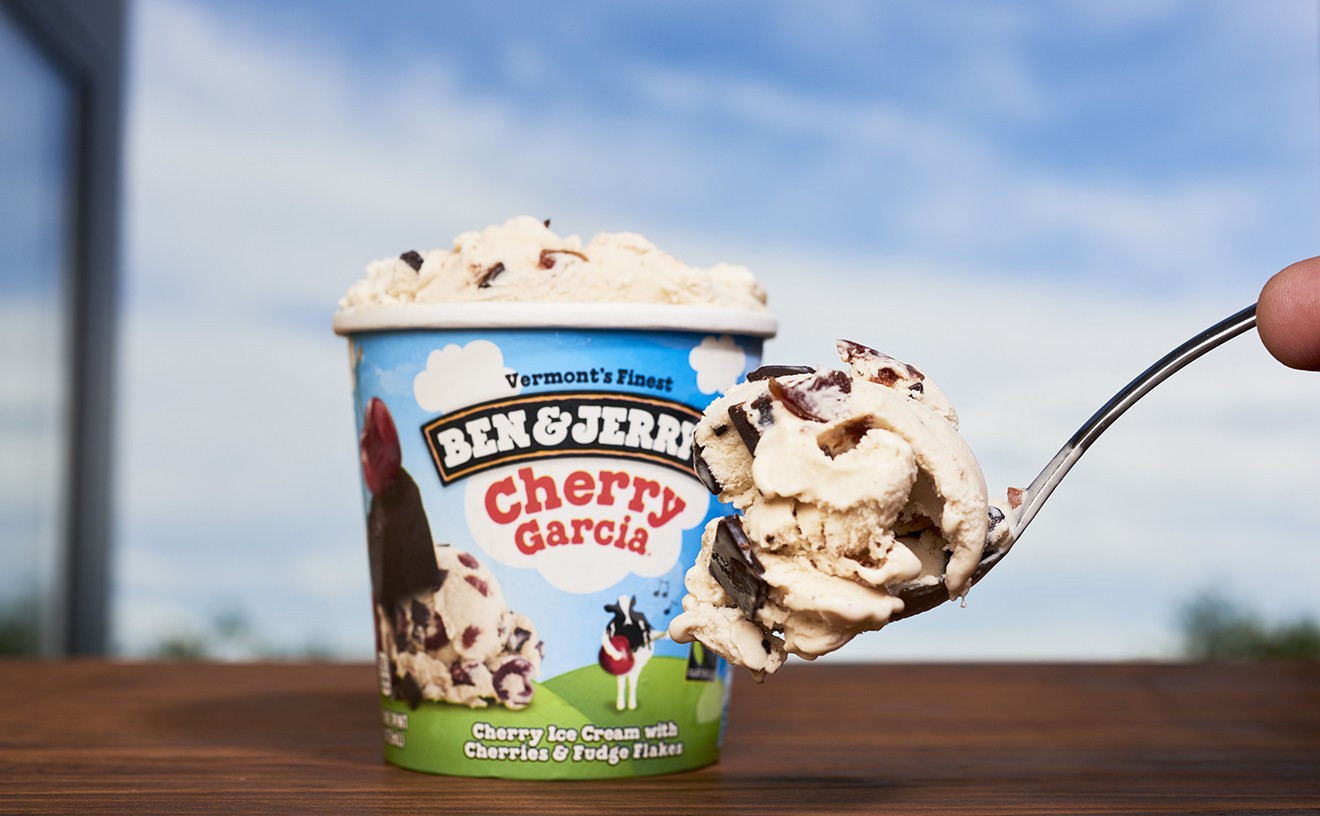Greeks are credited with sinking the piers of the culinary arts, pouring the slab and locking the cables into the bedrock. The Greek Archestratos composed the first cookbook in 330 B.C. The Greeks followed this milestone with headgear, inventing the toque, the tall top hat worn by chefs. Even the Romans can't escape Greek influence, developing their cuisine under Greek tutelage. Then came the upheavals, invasions, conquests and tyrannies. The culprits: Slavs, Franks, Serbs, Venetians and Ottomans, each pounding this culinary foundation with disparate but influential hammers. This is how lemons, potatoes, spinach and tomatoes burrowed into the basic slab.
Spanakopita, souvlaki, pastichio. This is not the conventional slang of Dallas noshing. Throw these terms in front of the average battle-hardened Dallas diner, jaded by volleys of guacamole and twice-baked potato, and you'll most likely be told the first two are the surnames of Sports Illustrated swimsuit-issue posers and the last a nut.
But these are staples of Greek cuisine; or rather the building blocks formed from a handful of staples. Creating these blocks are olive oil, olives, judicious use of herbs (oregano, thyme, mint, parsley) and cheeses--particularly the goat milk-derived and cured feta--that coddle chicken, lamb and seafood. Greek food ranges from earthy, to sparse, perfumed and exotic.
Yet in Dallas, Greek cuisine, where it exists at all, seldom moves beyond gyros and a salad of simple greens pummeled with feta cheese, tomato wedges and olives that are usually black mission instead of Greek. Add a Dorito and a dab of guac, and it becomes a taco salad.
Perhaps this is why Ziziki's on Travis Walk (with a newer appendage in North Dallas on Coit Road and an even newer one on the island of Maui, Hawaii) is a heroic steakless stalwart, surviving in the cutthroat flash and dash of the Dallas restaurant grinder for a decade. Owners Costa and Mary Arabatzis marked the decade post by adding a Greek coffee bar and a chef's table. Little else. Wasn't necessary.
Menu inspirations not only span Greek specialties but feature Italian influences as well--a salute perhaps to the Roman conqueror as culinary student.
The influence peers from items like fried calamari, a simple dish that few get right. The coating is either boring or greasy (or both) with throttled seasoning, or the calamari is either cold or tough (or both). Here the recipe is mostly right. The squid is sautéed--instead of deep-fried--in olive oil, white wine and lemon. This light touch is bracing nonetheless, giving it the spark that chalky, lackluster coatings too often lack. But the coating slips off the smooth squid like a stocking with elastic stretched into weariness. There are no tentacle knots with drooping and clasping fingers to shiver the spines of the finicky and the weak. This part is a shame. No self-respecting Greek weaned on acres of octopus salad would suffer this omission lightly. Dipping is done in a dish with two sauces: a marinara and Ziziki's sauce, a thin, creamy mix of yogurt, cucumber and herbs--a mix from which the restaurant takes its name.
There's a chicken and mushroom fettuccine as well, a dull spectacle in the context of this crisply chic bistro. (Hell, some publication even credited Ziziki's with possessing the best outdoor dining on account of the fountain in the Travis Walk garden courtyard.) In this dish, the large chicken breast pieces resemble Greek Isle shapes: Milos near the mushrooms; Kea under the thick tattered quilt of fettuccine strands. These islands and their siblings and cousins are home to some of the best seafood ever to wrestle in nets.
The breast meat leans dry, though this is somewhat moderated by a smooth béchamel sauce, shy of any provocative perfumes or invigorating flavors. Feta bits infest the well-prepared fettuccine ribbons, and the tomatoes, basil strips and shavings of Parmesan threaten to make the thing torrid, but blanks are shot.
Inside Ziziki's is a gentle amusement, with a black and white tiled floor, a cherry wood bar, textured walls, faux finishes, white columns, murals and glowing alcoves harboring wine bottles. Wine has long been a Ziziki's fixation, and the list has racked up a series of Wine Spectator "Award of Excellence" kudos (nine of 'em) since it opened a decade ago. The list is a short burst of moderate eclecticism with requisite ABCs: "anything but chardonnay" and "anything but cabernet," but no ABMs--"anything but merlot." You get a brood of whites--Oregon pinot gris, Alsatian riesling, Soave Classico, New Zealand sauvignon blanc--that don't taste like scorched lumber and honeydew, though the list leads off with a sizable chardonnay litter. (Be a peasant and dive into the retsina and roditis.)
There's a Mediterranean salad, a well-arranged plate of tomato wedges, broadleaf parsley, feta cheese, Greek olives, roasted garlic, cucumbers and "sweet onions." The latter is somewhat of a misnomer, as the onions, limp threads of red onion with olive oil and oregano, have more zing than sweetness.
Yet the Mediterranean salad is little more than an expanded version of entrée plate garnish. Order a couple of the selected entrées and you essentially get a Mediterranean salad by default. Not that this is bad, especially when the headliners are so good. Spanakopita is a precise layering of simple things presented simply. Thin layers of phyllo brushed with butter gently compress a layer of spinach, onions and feta. The phyllo is delicately crisp, and it retains butter richness without getting bogged down in its grease. Sharp feta cleans the lines between layers, yet the elements easily merge.
Same is true of the pastichio (or pastitsio). Nicknamed Greek lasagna, pastichio is allegedly Greek for hodgepodge. Yet it is more orderly than its Italian uncle. Though there is one hodgepodge thing about this: macaroni tubes. They are fastened at the bottom, stuck willy-nilly in different directions, like a complex digestive system severed from its moorings. The rest of the cube was highly organized. Chopped lamb baked with tomatoes, onions, herbs and the like resided near the bottom. Perfume billowed from that bottom layer, from cinnamon, I think. Bronzed mozzarella covered the top, and a splatter of béchamel sauce surrounded it.
Souvlaki is traditionally a dish of lamb chunks marinated in oil, lemon and oregano before they are skewered and grilled. Ziziki's not only applies the technique to lamb; it does the same for chicken, salmon and shrimp (an outage on our visits). The salmon is clipped into medallions and served on pita bread along with a topping of onions and the ubiquitous yogurt-cucumber squirt. The dirty pink meat is moist and tender with a clean grill taste that has a touch of smoke.
Arabic for "something stuffed," dolmades at Ziziki's are among the best we've sampled outside of Avner Samuel's stuffed grape leaves at the defunct Bistro A. The leaves are supple and tender with a slight electric tang of lemon. The core of seasoned rice is tender and separate instead of welded into a bullet. A wide stripe of Ziziki's sauce is spread over the flattened surfaces.
Baklava ice cream cake, a wedge of vanilla ice cream reamed with layers of nutty, buttered phyllo, is an amusing way to handle this desperately sticky sweet piece of dessert architecture, which is often dry and welded together with syrupy pap.
Oliver Stone should be so lucky.
4514 Travis St., No. 122, 214-521-2233. Open 11 a.m.-10 p.m. Monday-Thursday and 11 a.m.-11 p.m. Friday & Saturday. Open 11 a.m.-3 p.m. for brunch and 5-10 p.m. for dinner Sunday. $$-$$$.










